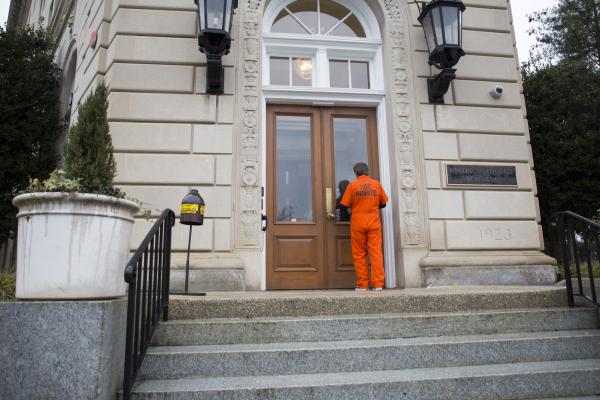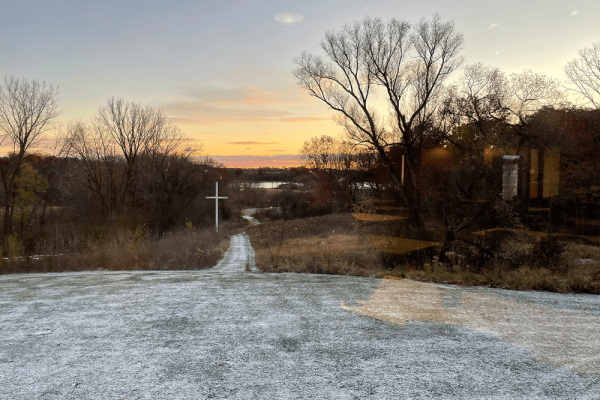Ray Krone is the 100th inmate exonerated from death row since it was reinstated in 1976.
He spent more than 10 years in jail, and two of those years on death row with all of its restrictions, humiliations, and isolation – as an innocent man.
As an honorably discharged military veteran and a postal worker with no prior record, his conviction was a surprise to him and his family. Prosecutors in Krone’s case argued that a bite mark on the victim’s chest belonged to him. It was later found that the first expert to study the bite mark said it was not a match. DNA evidence exonerated Krone, who for 10 years had maintained his innocence.
“Before I was sent to death row I didn’t have much of an opinion on it,” Krone told Sojourners. “Now I know that if they can put me on death row they can put anyone there.”
Krone now works with Witness to Innocence alongside Sister Helen Prejean and other death penalty abolitionists.
This week, Sojourners and Death Penalty Action, are organizing a virtual teach in about present-day death penalty abolitionists, and joining the Abolitionist Action Committee for a vigil and fast at the Supreme Court building from June 29 to July 2. These two events, focusing on biblical principles, aim to educate the public about why the death penalty is an inherently flawed approach to justice.
“The more you know about it the less you like it,” said Abraham Bonowitz, co-director of Death Penalty Action. “We want to show people how the death penalty has failed us as a public policy.”
The death penalty has taken many forms in the United States justice system. Its controversial existence has spanned centuries oscillating between support and resistance.
Since 1976, there have been 1,455 executions in the U.S; 2,902 people sit on death row today.
Although studies show that support for the death penalty is decreasing, 49 percent of Americans are still in favor of capital punishment.
For Christians, interpretations of what the Bible says about capital punishment vary significantly. But many Christian leaders — from mainline Protestants and Catholics to evangelicals — take a strong stance against capital punishment.
“When we put someone to death, we’re saying that we don’t believe in Christian orthodoxy — we believe in the orthodoxy of violence,” Jeff Hood, author of The Execution of God: Encountering the Death Penalty, told Sojourners.
Hood, a Dallas-based activist, pastor, and anti-death penalty activist, works with people on death row in Texas. He believes state-sanctioned killing — and Christian support for it — is a “perversion of Christianity and the message of Jesus,” and calls those who have been executed “martyrs of violence and martyrs of our heresy.”
Mark Osler, a legal scholar and former federal prosecutor agrees with Hood’s assessment — and his belief about the ineffectiveness of the death penalty stems from his direct experience.
“Within the Christian faith there is such potential to do work on the death penalty because at the center of the faith is a wrongful execution,” said Osler, author of Jesus on Death Row: The Trial of Jesus and American Capital Punishment.
Osler recalled the moment he began to realize how Jesus’ story directly affects death penalty action: while taking communion at a Baptist church in Waco, Texas.
“I realized this is the last meal of someone who is about to be executed,” Osler said. “The same way the accused murderer is bad, to Christians, Jesus is unbelievably good — and we don’t put ourselves in his place.”
Heather Beaudoin, the evangelical outreach specialist for Equal Justice USA, said the No. 1 argument she hears in favor of the death penalty is that some people deserve to be executed because of the heinousness of their crime. But, she said, a person’s access to representation has a bigger impact on likelihood of death penalty sentence than the brutality of the crime.
“It’s not the worst of the worst who are sentenced to the death penalty — it’s people who can’t afford an attorney,” Beaudoin said. “If you’re able to hire your own attorney you’re most likely not going to be sentenced to death.”
Studies from numerous organizations and universities have found that race and poverty play a significant role in whether a person is sentenced to death. In a Seattle Journal for Social Justice’s article titled “Race, Poverty, the Death Penalty, and the Responsibility of the Legal Profession,” the author says it’s clear that justice depends on how much money a person has.
Death penalty abolitionists say that the death penalty is barbaric and discriminatory — especially to black people. The Equal Justice Initiative calls the death penalty a “direct descendant of lynching,” arguing that the U.S.’s death penalty laws are defined by bias disproportionately targeting black people who were accused of committing crimes against white people. The Equal Justice Initiative explicitly says:
While African Americans make up less than 13 percent of the nation’s population, 42 percent of of those on death row are black, and 35 percent of those executed since 1976 have been black. And 75 percent of the murder victims in death penalty rulings are white — even though only about 50 percent of murder victims are white.
Race can also determine a person’s support for the death penalty: 71 percent of white people support it, while only 44 percent of black people do. If we break down statistics by religion and race, we find that 66 percent of white mainline protestants and 63 percent of white Catholics favor the death penalty. And two of the largest U.S. evangelical denominations, the Southern Baptist Convention and the Lutheran Church – Missouri Synod — teach that the death penalty is an acceptable form of punishment.
Of course we find instances of state-sanctioned death as punishment for crime as far back as the Old Testament and the Code of Hammurabi in 18th century B.C. Babylon. The fledgling United States initially took its lead from British rules about capital punishment. A 1972 Supreme Court case ruled that, as written, death penalty laws were cruel and unusual punishment — but the abolition was short-lived. A 1976 case upheld a newly written death penalty law and capital punishment has been deemed constitutional ever since.
Many argue the death penalty is based on outdated beliefs and that capital punishment is does not deter crime.
Osler argues that the purpose of the death penalty is two-fold — one is to fulfill society’s sense of retribution, and the second is to deter people from making similar decisions. But, there’s a catch. According to Osler, we as a society are terrible at exacting retribution and deterrence doesn’t work.
“Vengeance isn’t ours; it’s God’s. And when we’re acting out of that sense of vengeance we so often get it wrong,” Osler said.
For Bonowitz, there is hope.
“The death penalty is in its final gasps,” Bonowitz said.
“We might not all see that, but those of us on the inside of this struggle can see that.”
Got something to say about what you're reading? We value your feedback!






